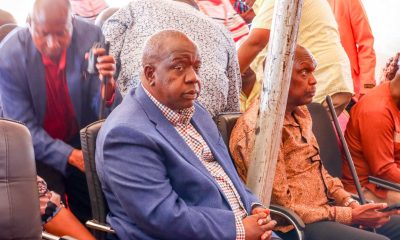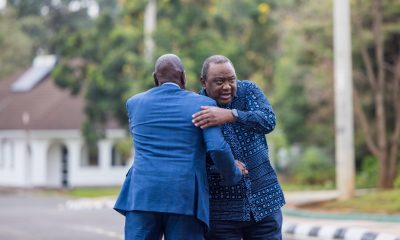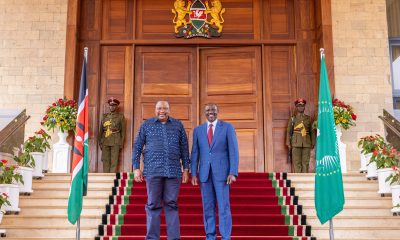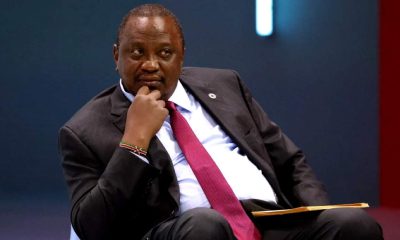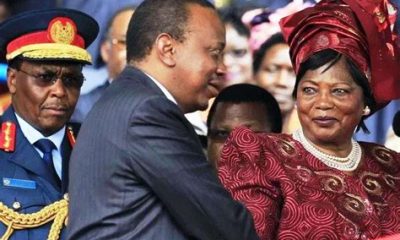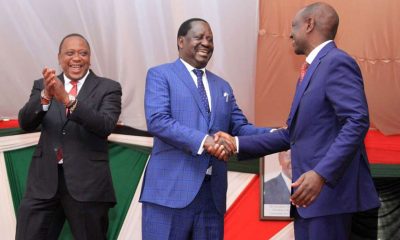Politics
2027 Presidential Race: Inside Uhuru’s Strategic Plot to Regain Influence
The former president’s support for Matiang’i is already playing out in the public domain. Sponsored media narratives have begun fronting Matiang’i as a viable candidate, and Uhuru’s Jubilee Party recently endorsed him as its flagbearer for the 2027 presidential race.
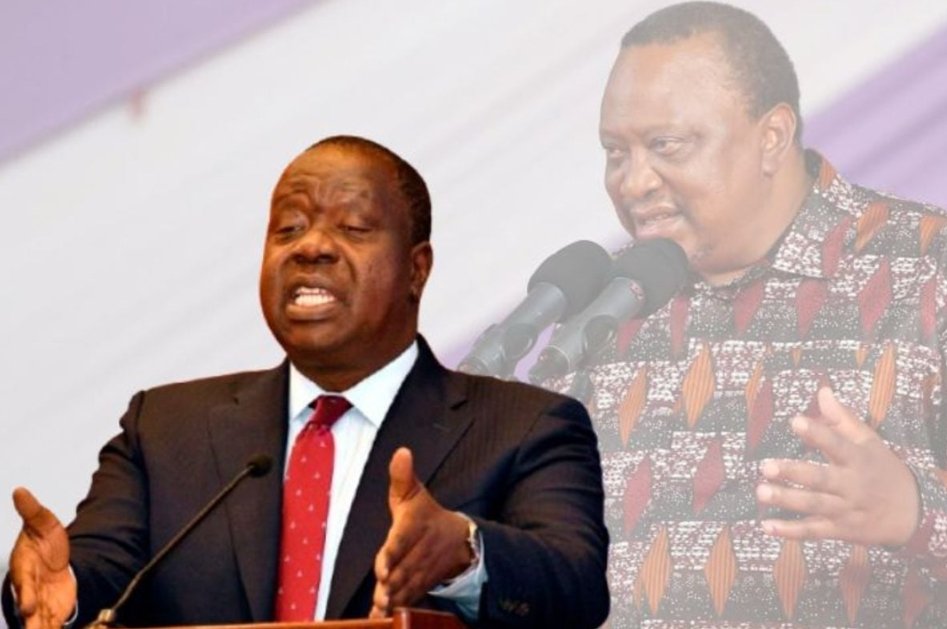
The 2027 presidential election in Kenya is shaping up to be one of the most fiercely contested in the nation’s history, with political heavyweights already positioning themselves for the top job. At the center of this high-stakes political chess game is former President Uhuru Kenyatta, whose behind-the-scenes maneuvers are drawing significant attention as he seeks to reclaim his influence in Kenyan politics.
Uhuru, who had hoped to maintain his grip on power by backing Raila Odinga in the 2022 elections, is now determined to play a pivotal role in shaping the 2027 race. Although constitutionally barred from vying for the presidency again, Uhuru is focused on preserving the Kenyatta family’s political legacy and ensuring his influence remains intact, particularly in the Mt. Kenya region and beyond.
Uhuru’s secret meetings with Matiang’i
Reports indicate that Uhuru has been holding discreet meetings with Fred Matiang’i, the former Interior Cabinet Secretary, signaling a strategic shift that could significantly alter the political landscape. Sources speaking to Kenya Insights reveal that these meetings, held at Matiang’i’s Karen residence and Uhuru’s family home in Ichaweri, Gatundu, are aimed at positioning Matiang’i as a strong contender for the presidency in 2027.
The former president’s support for Matiang’i is already playing out in the public domain. Sponsored media narratives have begun fronting Matiang’i as a viable candidate, and Uhuru’s Jubilee Party recently endorsed him as its flag bearer for the 2027 presidential race. This move underscores Uhuru’s determination to shape the next government and counter President William Ruto’s influence.
The Luhya Factor
A key aspect of Uhuru’s strategy involves selecting a running mate from the Luhya community, with potential candidates including Eugene Wamalwa and Governor George Natembeya. This move is seen as an attempt to split the Luhya vote, which could otherwise consolidate behind Ruto, especially if he opts for a Luhya running mate like Musalia Mudavadi. By presenting a Luhya deputy on Matiang’i’s ticket, Uhuru aims to divide the community’s support, complicating Ruto’s path to re-election.
In Matiang’i’s backyard of Kisii, local leaders, many of whom are drawn from the Orange Democratic Movement (ODM), have shown early signs of abandoning Raila Odinga to back Matiang’i. This shift was evident when Kisii Senator Richard Onyonka joined Kalonzo Musyoka and Rigathi Gachagua at the launch of Eugene Wamalwa’s Democratic Action Party of Kenya (DAP-K), headquarters. Onyonka, representing Matiang’i, signaled a collective agreement to form a coalition aimed at ousting Ruto—a coalition that Uhuru wants Matiang’i to lead.
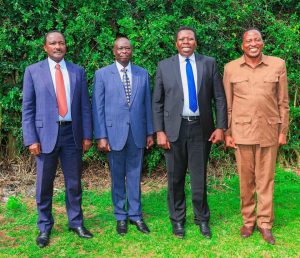
Former DP Rigathi Gachagua, Kalonzo Musyoka, Richard Onyonka joined Eugene Wamalwa at the launch of DAP-K’s new headquarters, with the party vowing to build alliance that will remove Ruto from power.
Matiang’i’s Credentials
Uhuru’s decision to back Matiang’i is not arbitrary but rooted in a long-standing professional relationship. Matiang’i served under Uhuru in various high-profile roles, including Cabinet Secretary for Interior, where he earned a reputation as a competent and reform-oriented administrator. His leadership during the 2017 elections, where he played a critical role in maintaining national security, earned him the moniker “Dr. Fix It.”
The involvement of Uhuru’s inner circle, including his brother Muhoho Kenyatta, suggests a family-backed political strategy aimed at extending the Kenyatta influence in Kenyan politics. The presence of former Solicitor General Njee Muturi further indicates that Matiang’i’s campaign will have robust legal and strategic support.
Gachagua Factor
The political landscape is further complicated by the ambitions of Rigathi Gachagua, the impeached former Deputy President, who is attempting to establish his own political base in the Mt. Kenya region. Gachagua’s rise threatens to fragment the region’s traditional voting bloc, which has been pivotal in past elections. Uhuru’s strategy appears to involve countering Gachagua’s influence by rallying support for Matiang’i, ensuring the region does not slip away from his sphere of influence.
Matiang’i’s Strategy
Matiang’i, with his background in academia, international organizations, and the Kenyan government, has built a resume that positions him as a candidate of change. To bolster his campaign, he has engaged international lobbying firms like Dickens and Madson to enhance his global image and connections. Domestically, he is forming alliances, notably with Gusii-based parties, to widen his voter base.
Reports also suggest that Matiang’i is planning to resign from his advisory position at the United Nations in New York to focus fully on his presidential campaign. While he has yet to publicly declare his candidacy, his proxies have been actively pushing his agenda, signaling his readiness to enter the race.
The Mt. Kenya Business Elite
The Mt. Kenya business elite, traditionally influential in shaping the region’s political choices, are at a crossroads. Divided between supporting Matiang’i, Kalonzo Musyoka, or Gachagua, their decision could prove decisive in the 2027 race. Uhuru’s influence is expected to play a critical role in swaying these key players to back Matiang’i.
A New Political Era?
As the 2027 race heats up, the narrative is one of strategic alliances, regional politics, and generational shifts. Matiang’i’s campaign promises a new style of leadership that resonates with an electorate eager for change. However, with competing power centers and shifting allegiances, the path to State House is fraught with challenges.
There’s also the explosive Gen-Z factor that would swing the elections in the most unexpected ways. Since the anti-government protests that almost collapsed Ruto’s administration last year, most young people have become politically active and are expected to vote largely in the coming election. It’s without a doubt that the opposition leaders including Matiang’i and Gachagua have been trying to stay close to be seen as fighting for the interests of the youths.
The Gen-Zs offered a rich vote bloc as they make nearly 40% of Kenyan voters.
The outcome of the 2027 election will not only determine Kenya’s next president but could also reshape the country’s political landscape for years to come. For Uhuru Kenyatta, the stakes are high as he seeks to cement his legacy and ensure the Kenyatta family remains a dominant force in Kenyan politics. Whether his strategy will succeed remains to be seen, but one thing is clear: the 2027 presidential race will be a defining moment in Kenya’s history.
Kenya Insights allows guest blogging, if you want to be published on Kenya’s most authoritative and accurate blog, have an expose, news TIPS, story angles, human interest stories, drop us an email on [email protected] or via Telegram
-

 News6 days ago
News6 days agoPlane Carrying Raila Odinga Becomes World’s Most Tracked Flight as Kenya Airways Honors Him With Special Call Sign ‘RAO001’
-
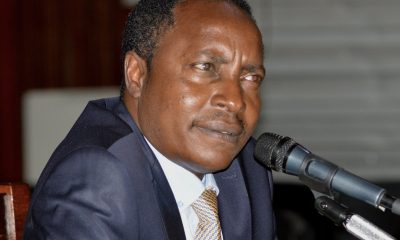
 News2 weeks ago
News2 weeks agoFormer Nairobi CEC Newton Munene Found Dead as Sonko Alleges Cartel Involvement
-

 Business1 day ago
Business1 day agoSafaricom’s Sh115 Trillion Data Breach Scandal: How Kenya’s Telecom Giant Sold Out 11.5 Million Customers
-

 News6 days ago
News6 days agoI Used To Sleep Hungry, But Today I Employ The Same People Who Once Laughed At My Poverty
-
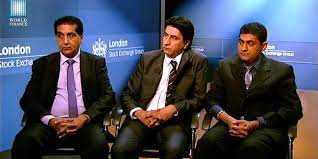
 Investigations6 days ago
Investigations6 days agoKwale Sugar Faces Liquidation Guillotine as Supreme Court Slams Door on Last-Ditch Rescue Bid
-
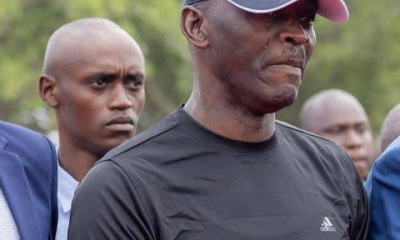
 News5 days ago
News5 days agoMaurice Ogeta, Raila’s Bodyguard: The Shadow Who Became The Story
-

 News1 week ago
News1 week agoInside 17 Minutes: CCTV Footage Reveals Murdered State House Guard Was Well Known to The Killer
-
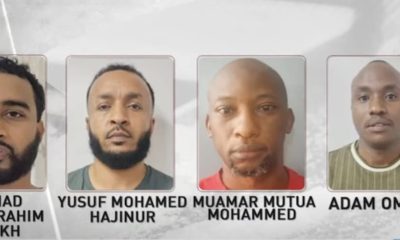
 News2 weeks ago
News2 weeks agoFour Arrested In JKIA Cocaine Cartel Crackdown

